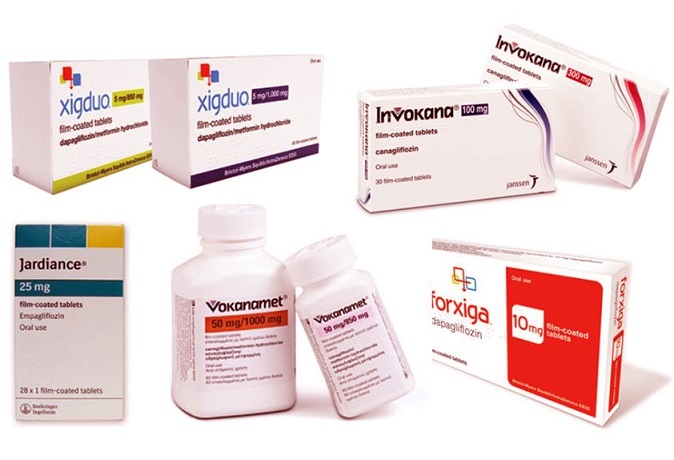Nikhil Prasad Fact checked by:Thailand Medical News Team Feb 16, 2025 1 month, 3 weeks, 4 days, 3 hours, 44 minutes ago
Medical News: A Revolutionary Approach to Inflammation Control
A new study conducted by researchers from the Institute of Cytology and Genetics, Siberian Branch of the Russian Academy of Sciences, the Research Institute of Clinical and Experimental Lymphology-Russia, National Research Tomsk State University-Russia, and the University of Heidelberg-Germany, has provided compelling evidence that sodium-glucose cotransporter 2 (SGLT2) inhibitors have powerful anti-inflammatory effects. These drugs, primarily used for managing type 2 diabetes, have now been found to influence immune system function in ways that may help reduce inflammation in various diseases.
 New Insights into How SGLT2 Inhibitors Help Reduce Inflammation in the Body
New Insights into How SGLT2 Inhibitors Help Reduce Inflammation in the Body
SGLT2 inhibitors, including empagliflozin, dapagliflozin, and canagliflozin, were initially designed to help regulate blood sugar levels by preventing glucose reabsorption in the kidneys. However, this
Medical News report highlights that their benefits extend far beyond glucose control. Researchers have now uncovered how these drugs can modulate immune responses by targeting macrophages - key cells involved in inflammation and tissue repair.
How SGLT2 Inhibitors Influence Macrophages and Reduce Inflammation
Macrophages are immune cells that play a critical role in both initiating and resolving inflammation. They can exist in two main forms: the pro-inflammatory M1 type and the anti-inflammatory M2 type. In diseases such as diabetes, cardiovascular conditions, and chronic kidney disease, an excessive presence of M1 macrophages leads to prolonged inflammation and tissue damage. The new study has found that SGLT2 inhibitors help shift the balance from M1 macrophages to M2 macrophages, thereby promoting an anti-inflammatory environment.
At the molecular level, SGLT2 inhibitors exert their effects by suppressing the activation of key inflammatory pathways, including:
-TLR4/NF-κB pathway: This signaling pathway is crucial in triggering inflammation, and its suppression reduces the production of pro-inflammatory molecules like TNF-α, IL-1β, and IL-6.
-NLRP3 inflammasome: This protein complex is responsible for activating inflammatory cytokines. By inhibiting its activation, SGLT2 inhibitors help reduce systemic inflammation.
-AMPK and PI3K/Akt pathways: These pathways regulate cellular metabolism and immune responses. Activation of these pathways by SGLT2 inhibitors enhances the protective functions of macrophages.
Beyond Macrophages - How These Drugs Benefit Multiple Organ Systems
One of the most exciting aspects of this research is that the anti-inflammatory effects of SGLT2 inhibitors are not limited to macrophages alone. The study shows that these drugs also influence other cell types, including:
-Endothelial cells: These cells line the blood vessels and play a crucial role in maintaining vascular health. SGLT2 i
nhibitors improve their function, reducing the risk of atherosclerosis and cardiovascular diseases.
-Smooth muscle cells: These cells control blood vessel constriction and relaxation. SGLT2 inhibitors help prevent excessive vascular calcification, which is a major risk factor for heart disease.
-Renal epithelial cells: In chronic kidney disease, inflammation and fibrosis contribute to progressive loss of kidney function. The study found that SGLT2 inhibitors protect kidney cells from inflammatory damage.
-T-cells: These immune cells play a role in many inflammatory diseases. SGLT2 inhibitors help regulate T-cell activity, further contributing to their anti-inflammatory effects.
Clinical And Experimental Evidence Supporting the Findings
The researchers analyzed data from both clinical studies and animal experiments to validate their findings. Clinical trials involving patients with type 2 diabetes showed that treatment with SGLT2 inhibitors significantly reduced inflammatory markers such as high-sensitivity C-reactive protein (hs-CRP), TNF-α, and IL-6.
These findings were consistent across multiple studies, including the EMPA-REG OUTCOME trial and the CANOSSA trial.
In animal models, SGLT2 inhibitors demonstrated strong anti-inflammatory effects in conditions such as atherosclerosis, kidney disease, and even Alzheimer’s disease. In diabetic mice, for example, SGLT2 inhibitors reduced macrophage infiltration in atherosclerotic plaques and improved vascular function. Similarly, in models of colitis, empagliflozin was found to decrease gut inflammation by suppressing pro-inflammatory cytokines.
Implications For the Future of Medicine
The implications of these findings are far-reaching. Since chronic inflammation is a key driver of many diseases, the ability of SGLT2 inhibitors to modulate immune responses could make them valuable therapeutic options for a variety of conditions beyond diabetes. Potential applications include:
-Cardiovascular diseases: By reducing inflammation in blood vessels, these drugs could help prevent heart attacks and strokes.
-Kidney diseases: Their ability to protect kidney cells from inflammation and fibrosis may slow down the progression of chronic kidney disease.
-Neurodegenerative diseases: Early studies suggest that SGLT2 inhibitors may have protective effects in conditions like Alzheimer’s disease by reducing brain inflammation.
-Autoimmune disorders: Given their role in regulating macrophage function, these drugs could potentially be explored for treating conditions like rheumatoid arthritis and lupus.
Conclusion
This groundbreaking research has uncovered new ways in which SGLT2 inhibitors exert their beneficial effects, extending their role beyond diabetes management to inflammation control in various diseases. By reprogramming macrophages and modulating key inflammatory pathways, these drugs offer new hope for patients suffering from chronic inflammatory conditions. Further studies are needed to fully understand the extent of their benefits and explore additional therapeutic applications.
The study findings were published in the peer-reviewed: International Journal of Molecular Sciences.
https://www.mdpi.com/1422-0067/26/4/1670
For the latest on Inflammation, keep on logging to Thailand
Medical News.
Read Also:
https://www.thailandmedical.news/news/thymus-vulgaris-extracts-show-strong-potential-as-natural-anti-inflammatory-agents
https://www.thailandmedical.news/news/discovering-new-anti-inflammatory-potentials-in-basella-alba-fruits
https://www.thailandmedical.news/news/olive-oil-polyphenols-show-promise-in-reducing-rheumatoid-arthritis-inflammation
https://www.thailandmedical.news/pages/thailand_doctors_listings
